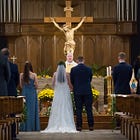Curiosity: An Unhealthy Search for Knowledge (as Taught by St. Thomas Aquinas)
There are some things we are not meant to know/understand.
Holy Week is upon us and I’ll admit that I feel some dread. This leads me to believe that I really need to enter into this time, feeling the sorrow that I want to deter. I’ll be praying for you all this week; please pray for me, too.
Today’s post is a bit different than what I’ve written in the past. This is not a major topic within Catholicism, but something that St. Thomas Aquinas wrote about in the Summa Theologica. I’ll share more of my own thoughts/reflections than I typically do, but there will still be the typical church document/book quotes so you can dive deeper through those sources.
Curiosity: Vice or Virtue?
According to the Summa Theologica, curiosity is a vice.1 St. Augustine, in The Confessions, also labels curiosity as a vice.2 This may come as a shock to many, since we live in a society that tends to use the word “curiosity” in a positive light. When I use this word, I’m talking about an unhealthy search for knowledge, which comes in many forms, but in this post, I’ll be discussing it in the light of seeking knowledge intellectually, such as through study (ie. reading), and how it can be an inauthentic search for truth.3
At the bare minimum, after reading this post, I at least want you to walk away with this: seeking knowledge is not inherently good, nor is it inherently bad. It is something which must be moderated. The virtue associated with moderation is temperance. “Temperance is the moral virtue that moderates the attraction of pleasures and provides balance in the use of created goods. It ensures the will's mastery over instincts and keeps desires within the limits of what is honorable.”4
“The desire or study in pursuing the knowledge of truth may be right or wrong.”5 - St. Thomas Aquinas
In the Summa Theologica, St. Thomas Aquinas has many specific virtues that fall under temperance. The virtue associated with a healthy search for knowledge is studiousness.6 (I use the word “healthy” to differentiate whether this search is good for our soul or not.) Or, put another way, studiousness should be considered a moderate search for knowledge. One who is studious does not bend to every desire in obtaining knowledge, nor become intellectually lazy.
Seeking Truth Authentically
I first read about the vice of curiosity in the Summa Theologica two years ago. It has not left my mind. Repeatedly, it has come to mind as I read or listen to podcasts. It is clearly a vice I, myself, struggle with. Recognizing this struggle has helped me greatly, as I’ve been able to purge unnecessary things from my life that would lead me to sin (looking at you, Instagram and Facebook!).
As mentioned above, being studious is not just about restraining one’s search for knowledge. It also involves not being intellectually lazy. If one has no desire for truth (which directly translates to not having a desire to know God), this is also wrong. As with everything in the spiritual life, we must allow prayer to guide us in our search for knowledge to ensure that we are seeking truth authentically.
How does one seek truth authentically? Let me try to explain by articulating what it is not. If one reads books, posts, etc. simply to prove oneself right, rather than with the aim of simply finding truth, since finding truth is finding God, then one has fallen into an unhealthy search for knowledge, which has led to pride (“I just want to be right, and I will seek knowledge to prove I am right”). As mentioned in 1 Corinthians 8:1, “knowledge inflates with pride”. We need to be sure we are not using “the knowledge of truth in order to sin.”7
“There is still another temptation, one more fraught with danger. In addition to the concupiscence of the flesh, which lures us to indulge in the pleasures of all the senses, and brings disaster on its slaves who flee far from you, there is also concupiscence of the mind, a frivolous, avid curiosity….It masquerades as a zeal for knowledge and learning.”8 - St. Augustine
Since this is so difficult (at least, it can be for me) an authentic search for knowledge must include prayers such as: “Lord, lead me to You, even if it means admitting I am wrong.” If admitting I am wrong means I will grow closer to Christ, I want to admit I am wrong. Growing closer to Christ is the ultimate goal here on earth.
I do find it important to intentionally listen to people I disagree with. The limited time I have makes this difficult, since I also enjoy listening to podcasts from Catholics I respect, so there’s a couple things I enjoy that helps me receive both sides of an issue: debates, long-form discussions between disagreeing parties, and rebuttal videos. Joe Heschmeyer recently debated Dr. James White on the Mass, for example. (It was great.) With rebuttal videos, one must recognize the bias that will inevitably be present in the clips being rebutted, so I’d recommend debates or long-form discussions over rebuttal videos.
Accepting Our Human Weakness & Submission
There are also things that we may never understand, such as the Trinity. However, we can have faith, knowing that the Trinity is true, while simultaneously not understanding that specific doctrine. In Pope Leo XIII’s encyclical Aeterni Patris (On the Restoration of Christian Philosophy), we read this sentiment:
“[I]t is evident that very many truths of the supernatural order which are far beyond the reach of the keenest intellect must be accepted, human reason, conscious of its own infirmity, dare not affect to itself too great powers, nor deny those truths, nor measure them by its own standard, nor interpret them at will; but receive them, rather, with a full and humble faith” 9
If you believe you must fully understand every single doctrine before you assent to it, you’ve misunderstood faith. As a Catholic, there are certainly things I do not fully understand, but once one believes in the Church Christ has established (check out my post on the Papacy), one can trust that He is protecting that Church from error. Anything She teaches can be assented to as an act of trust. St. Thomas Aquinas says the following:
“Although those things which are beyond man’s knowledge may not be sought for by man through his reason, nevertheless, once they are revealed by God they must be accepted by faith.”10
Catholics are required to believe in Dogmas, which we believe have been revealed by the Holy Spirit. Even if we do not understand a Dogma, we can trust that God has led His Church in declaring that Truth, so our faithful assent is necessary. In the same vein, Pope Leo XIII says:
“We know that there are some who, in their overestimate of the human faculties, maintain that as soon as man's intellect becomes subject to divine authority it falls from its native dignity, and hampered by the yoke of this species of slavery, is much retarded and hindered in its progress toward the supreme truth and excellence. Such an idea is most false and deceptive, and its sole tendency is to induce foolish and ungrateful men willfully to repudiate the most sublime truths, and reject the divine gift of faith, from which the fountains of all good things flow out upon civil society. For the human mind, being confined within certain limits, and those narrow enough, is exposed to many errors and is ignorant of many things; whereas the Christian faith, reposing on the authority of God, is the unfailing mistress of truth, whom whoso followeth he will be neither enmeshed in the snares of error nor tossed hither and thither on the waves of fluctuating opinion. Those, therefore, who to the study of philosophy unite obedience to the Christian faith, are philosophizing in the best possible way; for the splendor of the divine truths, received into the mind, helps the understanding, and not only detracts in nowise from its dignity, but adds greatly to its nobility, keenness, and stability.”11
While God gave us our intellect, we must not let it become a god. We need guidance, and that guidance comes from God through His Church. It is good to recognize our human weakness.
“Seek not the things that are too high for thee, and search not into things above thy ability: but the things that God hath commanded thee, think on them always, and in many of his works be not curious. For it is not necessary for thee to see with thy eyes those things that are hid. In unnecessary matters be not over curious, and in many of his works thou shalt not be inquisitive. For many things are shewn to thee above the understanding of men.” - Sirach 3:22-25 (Douay-Rheims)
I will end my thoughts with an excerpt from The Imitation of Christ by Thomas a Kempis:
“Every man naturally desires knowledge; but what good is knowledge without fear of God? Indeed a humble rustic who serves God is better than a proud intellectual who neglects his soul to study the course of the stars. He who knows himself well becomes mean in his own eyes and is not happy when praised by men.
If I knew all things in the world and had not charity, what would it profit me before God Who will judge me by my deeds?
Shun too great a desire for knowledge, for in it there is much fretting and delusion. Intellectuals like to appear learned and to be called wise. Yet there are many things the knowledge of which does little or no good to the soul, and he who concerns himself about other things than those which lead to salvation is very unwise.
Many words do not satisfy the soul; but a good life eases the mind and a clean conscience inspires great trust in God.
The more you know and the better you understand, the more severely will you be judged, unless your life is also the more holy. Do not be proud, therefore, because of your learning or skill. Rather, fear because of the talent given you. If you think you know many things and understand them well enough, realize at the same time that there is much you do not know. Hence, do not affect wisdom, but admit your ignorance. Why prefer yourself to anyone else when many are more learned, more cultured than you?12
Some Recent Substack Reads I’ve Enjoyed
This post by
has not left my mind since I read it. She shares a great tip for wives, which revolves around gratitude towards one’s husband.I really liked the advice
gave in her recent post on to do something you enjoy without a price tag attached.- ’s recent essay Working Mom, Interrupted was really great. As someone who, in my short time as a mother, has worked full-time, part-time, and not at all, I relate to this essay.
Lastly, I’ve been enjoying
as I continue decreasing my screen time. A recent post gave some ideas for changes one could make to get offline. This mission to get offline is very much tied in with this post on curiosity.
Thanks for reading! I hope you have a blessed Holy Week. - Jamie
Other Posts from The Gentle Nudge that you Might Enjoy…
cf. Summa Theologica, 2.2.167
cf. The Confessions, 11.13
St. Thomas Aquinas also talks about curiosity regarding sensitive matters, such as being nosy about other's’ lives. Curiosity often takes the form of gossip in these cases. I may expand on this in a future post, so stay tuned!
Catechism of the Catholic Church, 1809
Summa Theologica, 2.2.167.1
cf., Ibid., 2.2.166
Ibid., 2.2.167.1
The Confessions, 10.35.54
Aeterni Patris, 8
Summa Theologica, 1.1.1
Aeterni Patris, 9
The Imitation of Christ by Thomas a Kempis, Chapter 2








Thank you for this thoughtful post, Jamie! I have been thinking a lot about curiosity too, and asking myself what is Godly? Great food for thought! ❤️🙏🏻
Enjoyed this post Jamie! It reminds me of our notes conversation from a month (or two) ago!